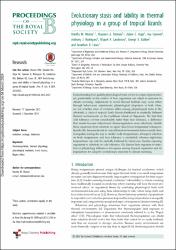/admin/item?itemID=37ffcadf-6c23-41a2-ac80-f775c6d23313
Evolutionary stasis and lability in thermal physiology in a group of tropical lizards

View/
Type of Access
OpenMaterial Type
ArticleType of Content
Scientific researchLanguage
EnglishCollection
- Investigación ambiental [1701]
Metadata
Show full item record| Abstract: | Understanding how quickly physiological traits evolve is a topic of great interest, particularly in the context of how organisms can adapt in response to climate warming. Adjustment to novel thermal habitats may occur either through behavioural adjustments, physiological adaptation or both. Here, we test whether rates of evolution differ among physiological traits in the cybotoids, a clade of tropical Anolis lizards distributed in markedly different thermal environments on the Caribbean island of Hispaniola. We find that cold tolerance evolves considerably faster than heat tolerance, a difference that results because behavioural thermoregulation more effectively shields these organisms from selection on upper than lower temperature tolerances. Specifically, because lizards in very different environments behaviourally thermoregulate during the day to similar body temperatures, divergent selection on body temperature and heat tolerance is precluded, whereas night-time temperatures can only be partially buffered by behaviour, thereby exposing organisms to selection on cold tolerance. We discuss how exposure to selection on physiology influences divergence among tropical organisms and its implications for adaptive evolutionary response to climate warming. |
| Author(s): | Muñoz, Martha M.
Stimola, Maureen A. Algar, Adam C. Conover, Asa Rodríguez, Anthony J. Landestoy T., Miguel A. Bakken, George S. Losos, Jonathan B. |
| Date: | 2014 |
| Published: | Proceedings of the Royal Society B: Biological Sciences, 281(1778), 20132433 |
| Citation: | Muñoz, M. M., Stimola, M. A., Algar, A. C., Conover, A., Rodríguez, A. J., Landestoy T., M. A., ... & Losos, J. B. (2014). Evolutionary stasis and lability in thermal physiology in a group of tropical lizards. Proceedings of the Royal Society B: Biological Sciences, 281(1778), 20132433. Recuperado de: |
| URI: | https://bvearmb.do/handle/123456789/4178
|

